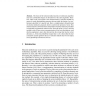Free Online Productivity Tools
i2Speak
i2Symbol
i2OCR
iTex2Img
iWeb2Print
iWeb2Shot
i2Type
iPdf2Split
iPdf2Merge
i2Bopomofo
i2Arabic
i2Style
i2Image
i2PDF
iLatex2Rtf
Sci2ools
134
Voted
PPSN
1998
Springer
1998
Springer
On Risky Methods for Local Selection under Noise
The choice of the selection method used in an evolutionary algorithm may have considerable impacts on the behavior of the entire algorithm. Therefore, earlier work was devoted to the characterization of selection methods by means of certain distinguishing measures that may guide the design of an evolutionary algorithm for a specific task. Here, a complementary characterization of selection methods is proposed, which is useful in the presence of noise. This characterization is derived from the interpretation of iterated selection procedures as sequential non-parametric statistical tests. From this point of view, a selection method is risky if there exists a parameterization of the noise distributions, such that the population is more often directed into the wrong than into the correct direction, i.e., if the error probability is larger than 1=2. It is shown that this characterization actually partitions the set of selection methods into two non-empty sets by presenting an element of eac...
Characterization | Distributed And Parallel Computing | Evolutionary Algorithm | PPSN 1998 | Selection Methods |
Related Content
| Added | 06 Aug 2010 |
| Updated | 06 Aug 2010 |
| Type | Conference |
| Year | 1998 |
| Where | PPSN |
| Authors | Günter Rudolph |
Comments (0)

